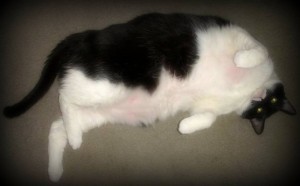Unfortunately, right along with our human widening waistlines, our pets have also become prime candidates for “the biggest loser, fat cat edition”.
Here are a few questions that might give you pause for thought about whether your cat is at risk for obesity, if not already there:
-
Question: Do you fill the food bowl, and just keep on filling it, every time your cat lets you know, loudly, that it’s empty or does your cat have mealtimes? Answer: Your cat should receive a measured portion of food, preferably twice daily.
-
Question: Do you measure the amount of food your cat gets? Answer: Your cat should receive a measured portion of food. Food should be reduced if your cat also gets daily treats.
-
Question: Do you know how much your cat eats every day? Answer: If not, is that because there are multiple cats in the home and you’re not sure if they’re all eating an equal amount? Or is it because you just keep filling the bowl every time it’s empty?
-
Question: Do you know how much your cat weighs and how much it should weigh? Answer: If your cat has not been weighed, it should be examined, weighed and if overweight, dietary recommendations should be made.
-
Question: Do you have playtime with your cat where he or she engages in physical activity? Answer: If not, many indoor cats suffer from boredom which leads to obesity secondary to overeating and lack of exercise.
-
Question: Is your cat unable to jump up to surfaces he/she used to easily be able to get to? Answer: Old age can lead to a decline in physical activity and ability, but obesity can lead to painful osteoarthritis which will further decrease your cat’s ability to exercise.
-
Question: Does you cat urinate or defecate outside the litter box? Answer: If yes, there are a number of possible causes for this common problem, however a cat needs to be able to position itself appropriately to use the litter box. Obese cats may find it painful or uncomfortable to squat in a little box, or may find it difficult to turn around in a box that does not accommodate their large size. Anal glands that are blocked due to inability to groom can also lead to defecation outside the litter box.
-
Question: Does your cat have difficulty cleaning his/her rear end due to a spare tire? Answer: If yes, your cat may experience serious adverse consequences. Cats are fastidious groomers and the inability to clean their rear end can lead to feces being pasted around the rear end or trapped in long hair. Lack of grooming can also lead to blocked or even painful abscessed anal glands.
-
More serious diseases that occur secondary to obesity include: Diabetes, hepatic lipidosis (fatty liver), painful osteoarthritis, increased risk for certain types of cancer, urinary tract disease, digestive tract disease. Check out The OSU Indoor Pet Initiative for more information about increasing your cat’s level of activity.
Call today to schedule your appointment to have your cat’s diet evaluated for appropriate caloric and nutritional content. We’ll also give you specific recommendations on how to help your kitty lose weight if necessary.
Check back soon for additional information or send us an email at info@thecatsoncommerce.com
